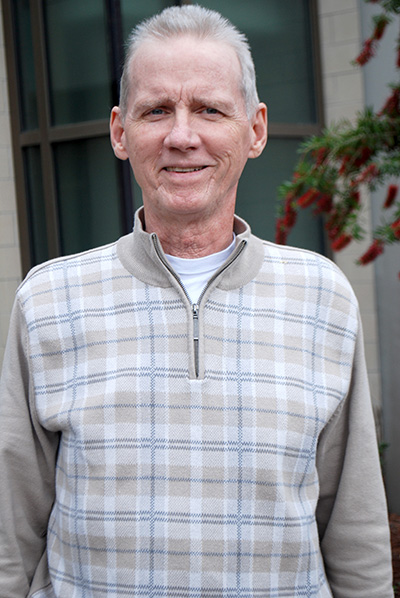Share your story
Want to share your cancer journey with us? We'd love to hear it. Please fill out this quick form and someone will be in touch with you soon.

Rick Kohl lives a healthy, active lifestyle. The Sun City, S.C., resident has always enjoyed running in marathons, biking, swimming and golfing. He’s never smoked and never even had any conditions that required surgery.
Cancer didn’t care.
After his dermatologist noticed an unusual spot on his skin, Kohl went for a biopsy. In December 2015, he was diagnosed with Stage III Melanoma. The cancer had spread to his lymph nodes.

“When this cancer came upon me, it was a shock,” Kohl says. “It does shake you up. It’s like a roller coaster of emotional feelings. Your priorities change in life, and you realize how important people are. You also reflect that you are not alone in this battle.”
During two surgical procedures at the VA Hospital in Charleston, Kohl had 18 lymph nodes removed. When it came time for follow-up treatment, Kohl chose to come to the Nancy N. and J.C. Lewis Cancer & Research Pavilion because of its closer proximity to his home. It was here he learned about clinical trials.
Clinical trials are research studies that involve patients and help doctors and researchers find new ways to improve treatments and the quality of life for people with disease. Clinical trials involve a variety of different methods of study ranging from a new drug or vaccine to combining a new treatment with an existing treatment to observation in addition to treatment.
Currently, the LCRP participates in approximately 85 trials open to accrual that study a large variety of cancer diagnosis. In 2016, there were 260 patients enrolled in clinical trials available at the LCRP. That is an estimated 16 percent of patient case load.
The clinical trials offered at the LCRP are available throughout the United States and the majority are funded by the National Cancer Institute. Find available clinical trials here.
The clinical trial Kohl participated in is for the drug pembrolizumab, or pembro for short, also known as Keytruda, and nicknamed the “Jimmy Carter Drug” because of its success ridding the former president of cancer following the spread of his Stage IV Melanoma. Kohl’s clinical trial compares the side effects and results of patients taking pembro (the investigational group) to the current treatment options interferon or ipilimumab (the controlled group).Kohl was selected at random to participate in the investigational group.
Partaking in the investigational group of this trial required Kohl to receive infusion treatments every three weeks for 18 treatments. He had his final round of immunotherapy on July 18, 2017. A follow up MRI and CT scan shows the cancer has not returned.
Folks participating in the controlled group that are on interferon are required to self-administer an injection three times a week for an entire year. While the majority of cancer treatments come with side effects, the side effects of interferon are more toxic and severe than pembro, including some patients that have suffered flu-like conditions during the entire year-long interferon treatment.
Kohl says he experienced some side effects of the pembro infusion including fatigue, rash, dizziness and shortness of breath.
“I experienced side effects, but on the other hand, I lived with it because the future is bright on the other end,” Kohl says. “I was very blessed to be on this trial. I’m convinced this is the right way to go. If you are a candidate for a clinical trial, I’d highly recommend doing it.”
Update: We checked on Mr. Kohl in August 2025 and are happy to say he is cancer free and doing amazing well!
Want to share your cancer journey with us? We'd love to hear it. Please fill out this quick form and someone will be in touch with you soon.